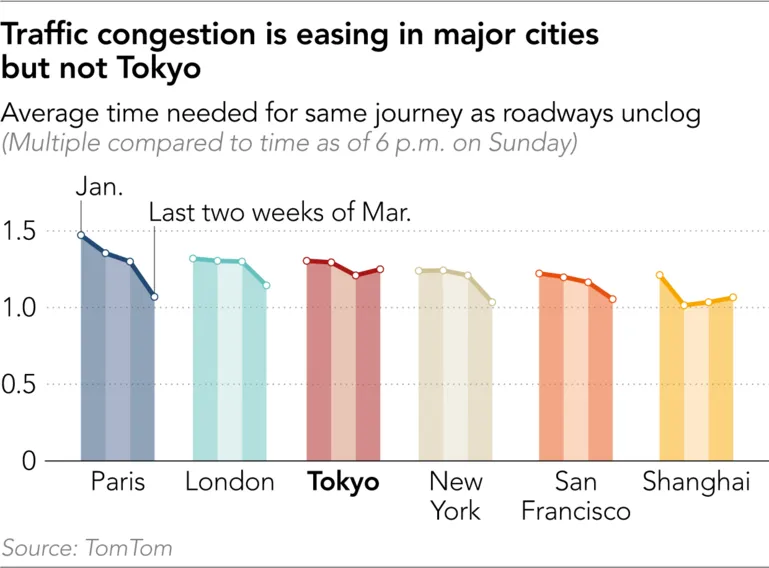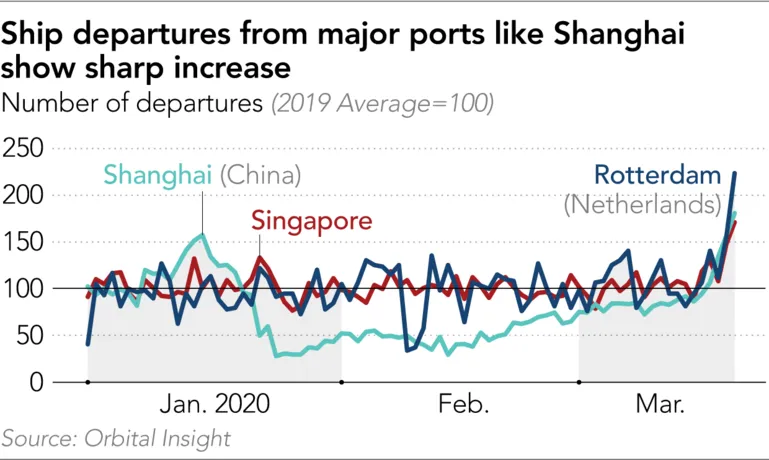
"Stay home. Essential travel only. Save lives."
An electronic bulletin board in London shows these words on an empty street. The British government on Thursday doubled fines for leaving homes to 60 pounds ($75). All restaurants, pubs and shops are closed, with the small exception of supermarkets.
Economic activity has frozen in cities around the world as the coronavirus pandemic rages, leaving only an eerie silence. Governments are telling residents to refrain from nonessential outings. People and cars have disappeared from roads, including in Japan's two major population centers of Tokyo and Osaka, which joined the stay-at-home movement this weekend.
But not all is lost. Data shows renewed activity in the flow of goods in China, as well as at ports worldwide that do business with the Asian country. The global economy's hopes hinge on this bud of recovery.
Online reservation service OpenTable says restaurant bookings have plunged this month in the world's major cities, such as London and New York. Restaurants are unable to open as people stay indoors.

Tokyo, which initially seemed exempt from this collapse, has begun to witness a drop in reservations, according to TableCheck, a restaurant and bar reservation website. Tokyo Gov. Yuriko Koike's call for all residents to stay home on weekends has had a profound impact.
A similar slowdown can be seen in road traffic. Dutch location technology specialist TomTom reports that weekend traffic jams have all but vanished from major cities worldwide, with the lone exception of Tokyo. Though historically low oil prices usually portend more outings, the fear of infection has dampened such sentiment.
"There's no work," a London taxi driver in his 40s said. "I cannot live like this."

But the flow of goods is rebounding in China, where the coronavirus initially wreaked havoc, as the outbreak there appears more under control.
The number of vessels leaving Shanghai, the world's largest trading port, has surged since mid-March, said Orbital Insight, a U.S. company that analyzes satellite images.
A representative of a Chinese logistics company noted a gradual increase in transportation of steel and chemicals by river from inland cities such as Chongqing and Wuhan to eastern coastal regions. Part of that demand comes as an alternative to trucks, which have been unable to move freely.
The signs of economic life are not limited to China, with the detection of an uptick in cargo leaving Singapore, the world's second-largest port, and the European hub of Rotterdam in the Netherlands.

"The recovery in cargo movement is a direct reflection of the resumption of Chinese production," said Simin Ngai, Dashboard Editor Asia at Cirium, a travel data and analytics company.
The resurgence of China, which as "the world's factory" is largely responsible for intermediate processes in the production of goods, has triggered the movement of ships worldwide that had been stranded or stalled.
"Now that China is ready to accept in ships, cargo movement has temporarily increased in Rotterdam and elsewhere," said a representative at A.P. Moller-Maersk, the world's largest container shipping company.
The shipping industry is bracing for a downturn in volume as major consumption hubs such as India are under lockdown. But if demand in China were to return, that could kick-start a frozen global economy.




















